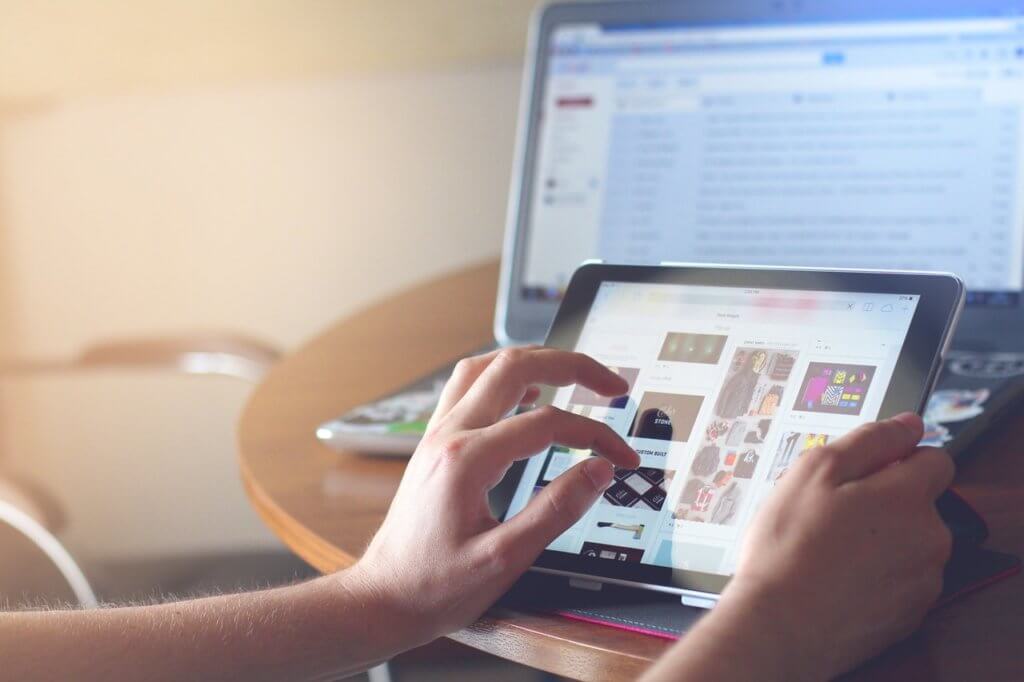Tablets are typically used for email, social media, news, general browsing, or video calls with your family. But, have you ever considered doing “real” work on a tablet before?
Most modern portable devices are technologically advanced enough that you could use them for work, depending on your job requirements, but they are not the best work device.
While tablets have more screen real estate than smartphones, the apps are virtually the same. Meaning, the version of Word on your smartphone is pretty much the same as the version on your tablet.
The larger screen size on tablets compared to smartphones gives app developers more flexibility to show more features, making the application more comfortable to use.
But, you can’t compete with the screen size and features of a laptop or desktop computer where there’s plenty of screen real estate to use all of the features.
Let’s look at some drawbacks to using a tablet device for “real” work.
Tablets Are Not Ergonomic
Tablets are designed for use on the couch, on the beach, at the park, and sometimes on the job. But, depending on your tablet’s size, it might not be comfortable to use for long periods.
Consider a waiter or waitress using a tablet to take orders at a restaurant. If they have to carry the tablet to each table throughout a 12-hour shift, then size, weight, and battery life will be factors.
However, a hostess that enters guest information into a tablet at the front of the restaurant can place the device on a table or flat surface instead of holding it for hours.
Have you ever tried using your tablet or smartphone to read or watch a movie in bed? It doesn’t take long before your hands or arms start to ache from holding your portable device in the same position.
Even though you can type on a tablet with both hands while holding it, it’s typically easier to set the tablet down or use an external keyboard.
Tablets Are Not Made For Intensive Work
For most office workers, Windows is the default operating system. Whether you have a laptop or a desktop, it’s probably running Microsoft Windows rather than macOS or a flavor of Linux.
By contrast, the most popular tablets run on iPadOS or Android.
While Apple and Android tablets offer apps like Microsoft Word and Excel, the experience is not quite the same as a laptop or desktop.
Even Microsoft Surface tablets, with their native Windows apps, would be challenging to use for intense working sessions like writing a lengthy email, creating a 40-page proposal, or editing an elaborate Excel spreadsheet. Even simple things like multi-tasking can prove to be difficult on a small device like a tablet.
To solve typing issues, you can get the best tablet with a keyboard in the market, but they are somewhat expensive and still do not provide the full desktop or laptop experience. External keyboards are often smaller and not as comfortable for long-term typing sessions.
Tablets Are Not Always Cost-Efficient
Yes, tablets do come in various price ranges, but what do you get for the price you pay?
The average price of a tablet in the U.S. is over $250. A “good” tablet – one that you would consider using for work – will cost several hundred dollars.
While budget devices are great for people concerned with cost, they will not have the features you need to get any real work done. They are primarily for entertainment, browsing websites, and communicating with your friends and family.
A good tablet will cost several hundred dollars, especially if you want to use it for real, productive work. At that price, you may want to consider a budget laptop instead.
Tablets Are Not A Replacement For Laptops
There are several activities you can easily carry out on a tablet. However, you will quickly run into the tablet’s limits.
Tablets are confined to categories. Unlike laptops, there are specific brands and types for certain activities.

For example, the Amazon Fire 8 has been a popular choice for budget tablets, but they have a low amount of RAM, inferior camera specs, and can only be used for limited activities.
The Lenovo Yoga Tab 3 Pro, on the other hand, has excellent battery life and sufficient RAM but hasn’t been getting software updates for a while.
So you have to take your pick based on what you want to do with the device.
Even if you find a device that gets your work done, it is not a good idea to make it your main device. You can use a tablet when you’re traveling or for urgent updates and emails. As a secondary device, it can be useful.
The most common types of tablets available are powered by Android. These have a slower processor with relatively low RAM. They might be great for watching movies, but not for work.
There are only a handful of tablets that allow you to perform several complex tasks at once. Tablets with a fast processor, lots of RAM, and plenty of storage often cost a small fortune.
If you are spending over $300 on a tablet, you may want to consider a budget laptop instead. Small laptops may not have the touch-screen features that you want, but they will get the job done faster than an underpowered tablet.
Tablets Are “Somewhere In Between”
This is a common term people use for tablets. They are a blend of laptops and smartphones. These “somewhere in between” devices have the best and worst of both worlds.
They have larger screens than smartphones, making the display delightful for media consumption. But, the software is often the same as a phone. In fact, in some cases, tablets have lower RAM and slower processors compared to some of the latest smartphones.
On the other hand, their software is not powerful enough to match a laptop’s. There are several built-in functions, including security systems, that you can find on laptops but not on tablets.
However…
Tablets are not bad devices. They’re great for reading, browsing the internet, and even gaming. So if you need a device to keep your kids occupied on long journeys – tablets are a great choice. Just don’t expect too much from it.
If you want to get a tablet for more than just a singular purpose, we suggest you get an iPad. iPads cost a lot more than a budget tablet but deliver significantly more than any other brand.
Finally
We have nothing against tablets. However, they are more of an entertainment device. If you want to play games, get an Xbox. If you want to work, get a laptop or desktop.
Maybe in the future, tablets will take over several other devices, but they have not gotten there just yet.




